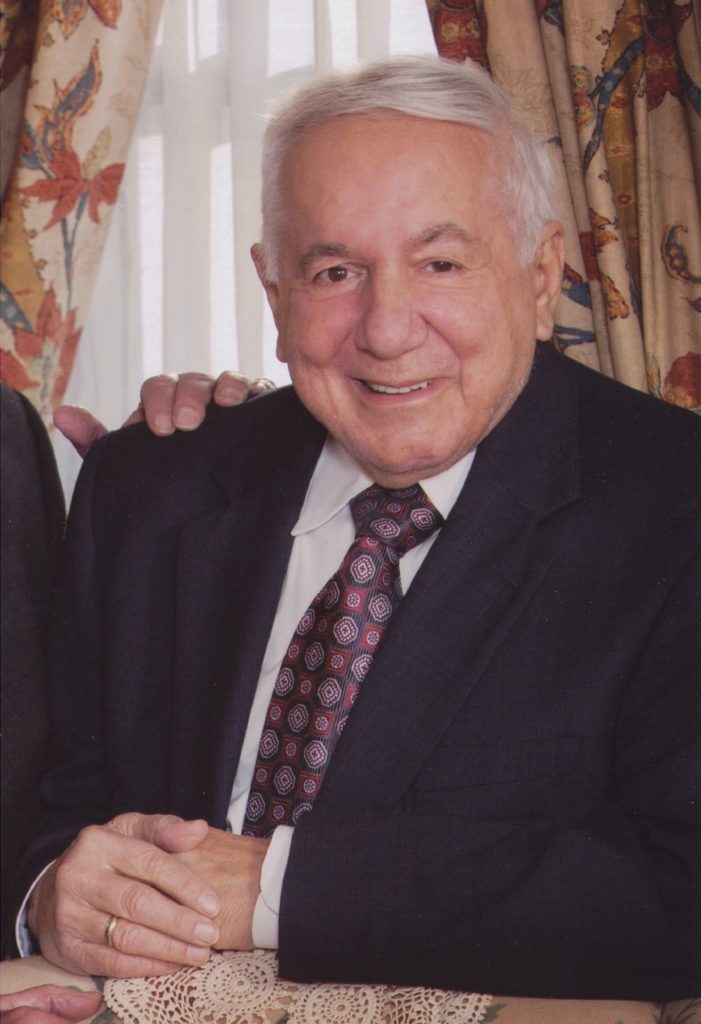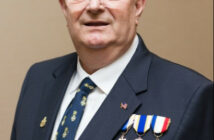
Peter N. Marudas
On November 20, 2021, Peter N. Marudas, beloved husband of Irene K. Marudas; devoted father of Nick Marudas and his wife Angela, and Kyriakos Marudas and his wife Monica; cherished grandfather of Mary Marudas and Peter Marudas; dear brother of Tom Marudas, fell asleep in the Lord. He is also survived by many nieces, nephews and cousins.
Friends may call at Ruck Towson Funeral Home on Wednesday, November 24, from 2 to 4 and 6 to 8 pm. Service and Interment are private. In lieu of flowers, donations may be made to the Greek Orthodox Cathedral of the Annunciation (annunciationbaltimore.org) or IOCC (IOCC.org). You may access the Funeral Home’s Guest Book and Condolences here: https://www.ruckfuneral.com/obituary/peter-marudas.
Board Member of Orthodox Christian Laity
Peter was a long-time and devoted board member of Orthodox Christian Laity. At the OCL Open Forum in Chicago in May 2004, he served as Moderator: https://www.youtube.com/watch?v=DQMvD8KnCgo. Peter also wrote an Occasional Paper for OCL entitled: New Strategy Needed To Save Endangered Ecumenical Patriarchate.
George Matsoukas, current board member, who served OCL as President and Executive Director, writes: “I was blessed to attend Peter’s 83rd birthday this past August 15, which is also his name’s day. He planned the party all year and hoped COVID restrictions would not prevent it. Peter and I had a very long and wonderful relationship. I will miss his wisdom and humor. He was a devout Orthodox Christian. He was a person who loved life and lived life to the fullest. We pray for his soul and family. May his memory be eternal. On this day, November 24, we pray together the last earthly prayers for Peter Marudas as he travels the path prepared for him by our Lord to his eternal rest. We thank God for his life. Our community has lost an extraordinary individual who made a difference in the life of our nation and our Orthodox Christian Church in America. His faith informed all his decisions. He was an optimist about the future. He based his decisions on facts, the truth, and his intuition. He was prudent, intelligent, and able to bring people together. This is how we knew him as a board member and friend. Peter was an individual of many dimensions. He was a devoted family man. His “dowry” was his mother-in-law, and he and Irene took care of her until she fell asleep in the Lord. He was a devoted brother. He adored his wife, Irene. They were soulmates and helpmates. She gave him space to do his extraordinary work. His legacy is his two sons and grandchildren. They will continue to be contributors to the life of our community. They will make their own contributions based on the example that Peter provided. Peter loved life. He loved music and dancing. He loved to party. He and Irene were wonderful dancers. They enjoyed traveling and listening to music. They loved our multicultural world. Rest in peace Peter. Thank you for making a difference in the life of our community. We celebrate your example of a good, faithful, fun-loving servant. Memory Eternal.”
Fellow OCL board member, Peter J. Petkas, shared the following article from the Baltimore Sun in 2001 when Peter Marudas retired from a productive and illustrious career.
HAIL AND FAREWELL
By Carl Schoettler
Baltimore Sun
August 18, 2001
National television cameras catch Peter Marudas, Sen. Paul S. Sarbanes’ chief of staff, and Allan Greenspan, chairman of the Federal Reserve, head to head in deep confab at a Senate banking committee hearing about a year ago.
Marudas immediately starts getting calls: What did he tell you? A hiccup from Greenspan can jump-start the stock market, up or down.
Marudas laughs. He likes telling this story.
He and Greenspan were talking about jazz.
As a young man, Greenspan played clarinet, flute and a little sax in New York jazz bands, including one led by Leonard Garment, who became President Nixon’s White House counsel. Marudas is a lifelong and knowledgeable jazz fan.
A couple of months earlier, Marudas had asked him, “Who do you think is the best saxophone player?”
Greenspan replies, Ben Webster, a mainstay of the Duke Ellington band.
“That’s really an aficionado,” Marudas exclaims. “You got to know jazz to say that.”
So the next time Greenspan comes before the banking committee, Marudas gives him a Ben Webster tape. And the two are recorded for TV posterity talking about jazz, not G-8 economics.
Bringing Greenspan the Webster tape exemplifies Pete Marudas’ style: kind, thoughtful, generous and politically astute. For nearly 35 years, Marudas has brought his particular, perhaps unique, political acumen to Baltimore, Maryland and national politics. Now, he’s bowing out.
The farewells began Wednesday as he celebrated his name day at the Greek Orthodox Cathedral of the Annunciation. It was the Feast of the Dormition, the Assumption in most Western churches. Marudas’ name in the church is Panagia, which is roughly Greek for “Our Lady,” the Virgin Mary. He’s a devout Orthodox Christian and of course active in church politics.
Thursday he celebrated his 64th birthday, basically working in his Washington office, although well-wishers flooded the Sarbanes switchboard with birthday wishes and goodbyes.
Friday was his last day at work and the end of his own remarkable chapter in Maryland politics.
“It’s an existential decision,” he says of his retirement. “We got the senator re-elected in the fall and he’s now a chairman, which is what we were working for all the years. The Banking Committee, you can really do a lot there, the predatory lending business, you know, and just the integrity of the capital markets.”
He still had a portrait of Franklin Delano Roosevelt on his office wall yesterday as he got ready to leave. “I got Truman, Roosevelt and Jefferson. And I have a labor union organizing picture from the C.I.O., ‘March with CIO to Victory.’ Well, we owned this bar where all these U.A.W. workers came in, when I grew up in Detroit,” he says.
As a kid, he spent his summers in Baltimore where his uncle ran a dry-cleaning shop on Light Street in what is now Federal Hill, and he had relatives who lived in Brooklyn. Another uncle ran a restaurant in Curtis Bay.
“The first political event I ever attended was in the 1952 campaign,” Marudas says. “The Democratic candidates always kicked off their campaign in Detroit on Labor Day.”
Adlai Stevenson was the presidential candidate.
“My cousin and I got up real early, 5:30. Our mothers packed our lunches. We took the bus down. We were right down in front. Walter Reuther [the leader of the United Auto Workers union]introduced Adlai Stevenson,” Marudas recalls.
“I was 15, my cousin was 12 or 13. It really made an impression for me. Stevenson was a man of such dignity.”
As a college student at the University of Michigan, Ann Arbor, Marudas attended a lecture by Reuther, who spoke on labor economics.
“He was a real force. He put the U.A.W. on the progressive side of the political spectrum,” Marudas is remembering. “You had people who came up from the South, white and black, where down there they had nothing to do with each other. They worked together as shop stewards. We saw all that going on. It really was something.
“You look at society: Wherever you have free trade unions, they’re one of the essentials of a free society.”
New Deal Democrat
He says it twice during a couple of long conversations. He remains an unreconstructed Roosevelt New Deal Democrat, with perhaps overtones of Adlai Stevenson.
“He’s very strong democrat with a small ‘d’,” Senator Sarbanes says. “He’s a good Democrat with a big ‘D’. But more importantly he’s a democrat with a small ‘d’.
“He doesn’t have an ounce of meanness in him, at all,” Sarbanes says, with obvious fondness in his voice. They’ve been personal friends longer than they’ve been political colleagues. “He’s really very generous and respectful with people. He really accords people their dignity.”
The two met when Marudas was covering City Hall for The Evening Sun. Marudas had studied journalism and earned a master’s degree at Ann Arbor. He came to Baltimore to work on The Evening Sun in 1963.
Sarbanes, who had been working for Walter Heller, the chairman of the Council of Economic Advisors under Presidents Kennedy and Johnson, came back to Baltimore to become executive director of a commission to revise the city’s charter.
Although Marudas grew up in Detroit and Sarbanes in Easton, Marudas says their roots were in the same province in Greece, Laconia, in Sparta.
“Our villages are 15 or 20 miles apart,” he says. “We got to know each other, became personal friends and then our careers came together in ’71.”
Sarbanes had been a congressman about nine months when Marudas joined him in Washington.
First political job
Somewhat paradoxically, Marudas’ first political job was for a Republican, Theodore Roosevelt McKeldin, who had been governor of Maryland and was in his second term as mayor of Baltimore. McKeldin was a liberal Rockefeller Republican of a type virtually extinct in today’s GOP.
One of McKeldin’s aides was leaving and he called Marudas: “‘The Governor’ – we called McKeldin the Governor then – would like you to take my place.” ‘Me!’ I said. Then I thought he’s got less than a year to go. I went home and talked it over with my wife and my mother-in-law.”
His wife, Irene, has been perhaps his closest advisor. They’ve been married for 39 years.
“I thought, Baltimore is the sixth largest city,” he continues. “It will be a chance to get a look at the inside of government and maybe come out again and pursue a career in newspapering.”
He worked for McKeldin for 10 or 11 months.
“He was a quick learner,” says Gene Raynor, the former head of the state election board and an astute political observer in his own right. “He became a master of precinct politics in the Byzantine world of politics in Baltimore City in the mid-’60s. There were not many people around who understood it as well as Pete Marudas. If I were a candidate anywhere in this state I would seek out Pete for advice.
“Paul is a kind of brainy guy, very, very smart, very, very brainy,” Raynor says. “But he was in the clouds. Marudas was right down to earth. They complemented each other.”
Thirty years ago, a somewhat wistful McKeldin told an interviewer: “He [Marudas] was the best in history. If only I had had him earlier in my career.”
The same reporter who quoted McKeldin said a half-hour interview of Marudas stretched into a 90-minute discourse on Baltimore, the nation, Greece and the Orioles.
Marudas has not changed much over the years. He’s an animated talker whose conversation moves by digression. His conversation veers happily from local to national to international politics like a bumper car in an amusement park.
Today, you’d certainly have to add the Mideast and the Balkans – and jazz.
Some tough years
Marudas stayed on with Thomas A. D’Alesandro III after McKeldin left the mayor’s office. They were tough years for Baltimore and the nation.
“I was thinking what I have been through and seen,” Marudas says. “In the summer of ’67, Newark and Detroit exploded. We felt we got through that summer. In ’68, we had the assassinations. We had the urban disturbances. We had the Catonsville Nine trial. We had the [George] Wallace campaign.
“Then the war came in. Kent State. Johns Hopkins, they lost control over there. We had to helicopter [Charles McC] Mathias, then an anti-war member of the House of Representatives, to speak to the students. We had all those demonstrations. We didn’t have what I’d call a normal year until ’71.”
That’s when D’Alesandro decided not to run for a second term and Marudas went to Washington to work for Sarbanes.
“He brought one outstanding faculty as far as service to me as mayor and I think maybe to Sarbanes as senator,” D’Alesandro says. “He had the ability to read people. He could sense sincerity or baloney.
“He was almost like my alter ego. I sort of found in him somebody who thought like I thought. And he sort of read me, in the sense he knew the things I was interested in. He encouraged me in some things and cautioned me in other things.
“And never had a hidden agenda. You knew you were getting a real honest critique . . . And if we made a decision against him he went along. He sang the song.
“I don’t ever remember him trying to take credit for anything. Everything was for me as mayor and Sarbanes as senator . . . I loved the guy.”
And Sarbanes tells roughly the same story.
“When you draw advice and counsel from Peter,” he says, “the bottom line is always do the right thing.”
He laughs.
“If he thinks you’re going in the wrong direction he’ll tell you in no uncertain terms. And he’ll keep telling you if you keep moving in that direction.”
Prized discretion
Marudas’ discretion is also legendary, highly prized by his bosses, but sometimes irritating to council members at City Hall. He’s the reigning master of obfuscation.
Former Mayor Kurt L. Schmoke remembers council members complaining that they often did not understand what Marudas had just said.
“That was Peter being creatively enigmatic,” Schmoke says. “That was his trademark.”
Marudas picks up his own narrative thread: “I go over to Washington, saying maybe we have all this stuff behind us and in a couple of years we’re into an impeachment. And Sarbanes is on the Judiciary Committee and he offers the first article of impeachment as a junior member.”
Perhaps inevitably he thinks the Nixon impeachment was justified and Clinton’s was not.
“You don’t impeach a president for a lack of personal judgment,” says Marudas, who read every single constituent letter on the Clinton impeachment received in Sarbanes’ office. “He has to have violated his constitutional oath. Then you have to have really very strong constitutional grounds, not some flimsy excuse.”
He returned to Baltimore again in 1987 for a stint as a seasoned senior member of the administration of Schmoke.
“I always wanted to work for someone younger than me,” Marudas says. “My grandfather always said when you’re young learn from the old. When you’re old learn from the young.
Schmoke actually had been an intern in Sarbanes’ office in the House of Representatives. He’s as effusive in his praise of Marudas as the other politicians.
“If I were designing a course at a public policy school, and including a description of the effective staff person,” says Schmoke. “I’d model that person on Peter Marudas.”
Everybody asks if Marudus can actually leave politics behind. Sarbanes expects to be able to call on his advice when he needs it.
But right now Marudas plans to go to a wedding in Detroit with his wife, Irene. He’ll listen to a lot of jazz. And he’ll do a lot of dancing. He and Irene love dancing, especially salsa.
UPDATE from Baltimore Sun
Peter N. Marudas, Respected political strategist and adviser to three Baltimore mayors and a US senator, hailed as ‘a great public servant,’ dies
Peter N. Marudas, recalled as an astute political strategist who worked calmly behind the scenes for three Baltimore mayors and a U.S. senator, died of heart failure Nov. 20 at his North Baltimore home. He was 84.
Mr. Marudas, a mainstay of Maryland’s Democratic political scene, worked to elect former U.S. Sen. Paul Sarbanes and was later his chief of staff.
“He was a brilliant political analyst who was able to develop a great strategy,” said former U.S. Sen. Barbara A. Mikulski. “He had an ethical personality and came out of the heritage of [President] Franklin Delano Roosevelt’s New Deal and John Kennedy’s New Frontier.”
Former Baltimore Mayor Kurt L. Schmoke recalled that Mr. Marudas was not well known because he was not an elected official.
“But Pete was a great public servant. He believed strongly that government could help people,” said Mr. Schmoke, who tapped Mr. Marudas for his administration.
Born in Detroit, he was the son of Nicholas P. Marudas, a small-business owner and salesperson, and Lula Leventis, a homemaker. He was a 1955 Mackenzie High School graduate and ran track at the school.
Mr. Marudas received a bachelor’s degree from the University of Michigan in Ann Arbor in 1960 and a master’s degree in journalism from the same school.
He spent his childhood summers in Baltimore, where an uncle operated a Light Street dry-cleaning business and another uncle had a Curtis Bay restaurant.
Attracted to politics as a teen, Mr. Marudas watched Adlai Stevenson, the Democratic nominee for president in 1952, campaign that year in Detroit.
Mr. Marudas met his future wife, Irene K. Semerly, while they were students at Michigan.
He moved to Baltimore and joined the staff of The Evening Sun in 1963. Mr. Marudas initially covered police in Howard and Carroll counties, and was soon assigned to cover Baltimore’s City Hall.
In 1967, late in the administration of Mayor Theodore R. McKeldin, he took a top job in the mayor’s office.
Mr. McKeldin later complimented him by saying, “If only I had had him earlier in my career.”
Mr. Marudas was described in a 1972 Sun profile: “If any reporter thrived in a job it was Marudas. He quickly found something in common with everyone in City Hall and with everyone who visited there.”
He forged a strong friendship with Mr. McKeldin’s successor, Thomas J. D’Alesandro III, and held a similar trusted post as the mayor’s confidant and No. 2 person.
Friends said he mastered the Byzantine-like world of Baltimore’s precinct politics.
Mr. D’Alesandro, speaking in a Sun article in 2001, said of Mr. Marudas: “He could read people. He could sense sincerity or baloney. He was almost like my alter ego. I sort of found in him somebody who thought like I thought. … And [he]never had a hidden agenda. You knew you were getting a real honest critique.”
Kalman “Buzzy” Hettleman, with whom Mr. Marudas worked on three occasions, said, “He was lovable. If there was a Greek ‘Fiddler on the Roof,’ it would be Peter. He was the most optimistic human being. He was always upbeat and he brought people along.
“Peter was steeped in the culture of the people and nations. And, of course, he drew on the Greek traditions. But he was just a special human being. He brought out the best in everyone. People glowed and felt enriched by Peter. He did not have a polarizing bone in his body.”
Mr. Hettleman discussed how Mr. Marudas worked in a campaign: “He had a good intuition and feel for people. He could talk to a taxi driver or a restaurant diner. He had great instincts and judgment. He had soul and a feel for people.”
He recalled Mr. Marudas’ ability to judge politics.
“We’d sit in a room and you’d hear from the pollsters and the campaign media people, and Peter always had a distinctive and different viewpoint,” Mr. Hettleman said. “He would add a dimension born of his extensive knowledge of U.S. and world history in ways that pollsters don’t always understand. … He had a longer vision of things than just beyond the moment.”
After Mr. D’Alesandro declined to run for reelection as mayor, Mr. Marudas became Mr. Sarbanes’ chief of staff. He had met Mr. Sarbanes as a reporter when the latter was executive director of the Baltimore Charter Revision Commission.
He was actively involved in the campaign when Mr. Sarbanes, then a state delegate, successfully challenged veteran congressman George Fallon in the 1970 Democratic primary for the 4th District seat.
Mr. Marudas played a role six years later when Mr. Sarbanes defeated former Sen. Joseph Tydings in the primary for the U.S. Senate and went on to win the seat from Republican incumbent J. Glenn Beall Jr.
U.S. Rep. John Sarbanes, a son of the late senator, said: “Peter was without question my father’s most trusted adviser over a period of years. Whenever my father was to make a decision about his life’s trajectory, Peter was the first he consulted.”
Mr. Sarbanes also said, “Peter was an indomitable spirit. An optimist, he saw the glass half full. He was deeply intellectual and had a knowledge of history wherein he could take current events and put them in a broad context.”
A 2001 Sun article described Mr. Marudas’ style: “Kind, thoughtful, generous and politically astute. For nearly 35 years, Marudas has brought his particular, perhaps unique, political acumen to Baltimore, Maryland and national politics.”
The article recalled Mr. Marudas’ manner of talking: “His conversation veers happily from local to national to international politics like a bumper car in an amusement park.”
Mr. Marudas continued as chief of staff until 1988, when he joined Mr. Schmoke’s administration as intergovernmental liaison.
In 1994 he returned to Sen. Sarbanes as chief of staff. Mr. Marudas retired in 2001.
In addition to his wife of 59 years, a former Franklin High School teacher, survivors include two sons, Nicholas P. Marudas of Atlanta and Kyriakos P. Marudas of Baltimore; a brother, Thomas N. Marudas of Baltimore; and two grandchildren.
Services are private.




1 Comment
It has been a privilege and honor working with Peter Marudas over many years in OCL. I loved having exhilarating and “spirited” experiences with him. Peter displayed exceptional critical thinking skills with clarity and compassion in a genuine and joyous manner…always infused with hope and wisdom. He will be missed. May his memory be eternal.